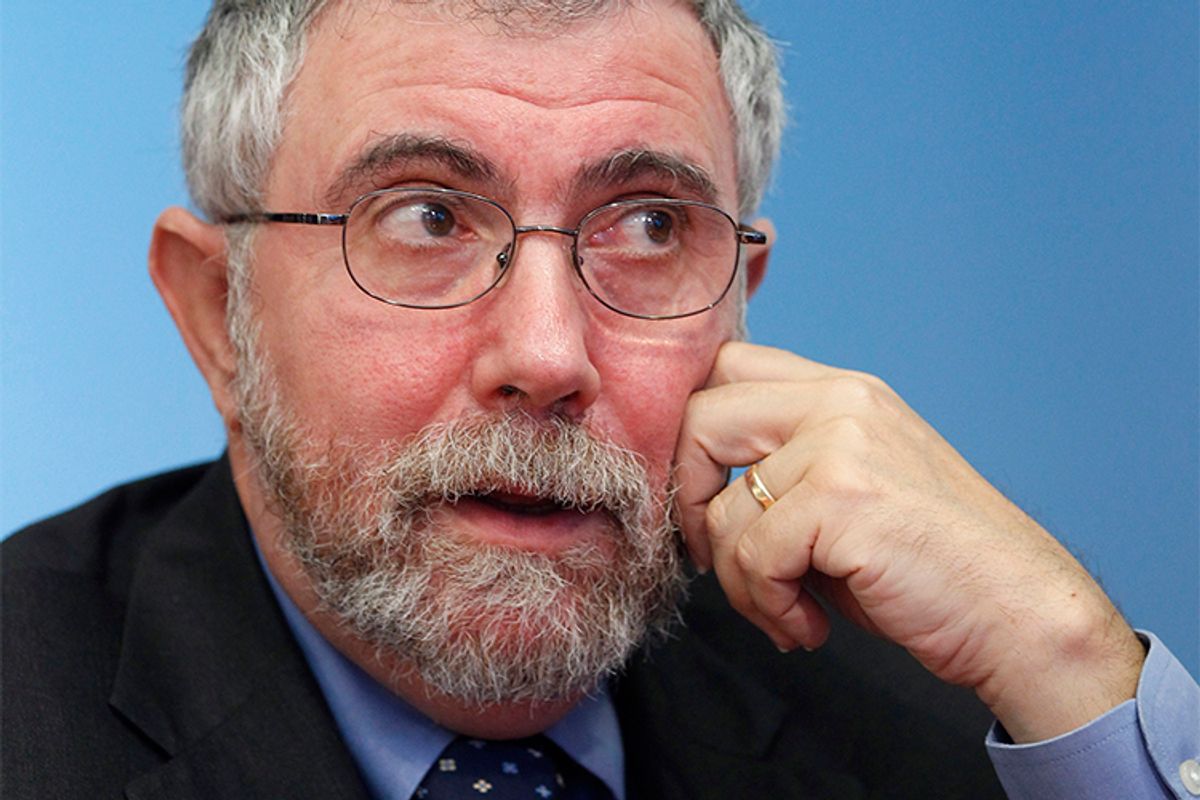For a good while last week, it appeared that an odd-bedfellows coalition of Tea Party conservatives and progressive populists stood a good chance of scuttling a massive spending bill funding most of the government through the fiscal year. Conservatives and liberals opposed the spending bill for different reasons, of course, with conservatives indignant that the measure didn't defund President Obama's immigration action and liberals crying foul over a provision repealing part of the 2010 Dodd-Frank financial reform law.
Those objections didn't stop the House and Senate from ultimately sending the spending bill to President Obama's desk, where he has indicated that he'll sign the measure. But economist and New York Times columnist Paul Krugman remains outraged at the bill's rollback of financial reform, calling it "utterly indefensible" in his column today.
"The incoming congressional majority has revealed its agenda," Krugman writes, "and it’s all about rewarding bad actors."
How does the spending bill reward bad actors? The provision in question -- inserted by Republican Rep. Kevin Yoder of Kansas but actually written by Citigroup -- essentially allows big banks to make risky bets on the taxpayer's dime. The Yoder/Citigroup policy rider repeals Dodd-Frank's "swaps pushout rule," which prohibited firms from using taxpayer guarantees to deal in high-risk financial instruments known as swaps.
"If banks are free to gamble, they can play a game of heads we win, tails the taxpayers lose," Krugman notes.
Stressing that the swaps rule repeal doesn't strike a "fatal blow" to financial reform, Krugman declares that it's "still outrageous." And Krugman places the blame squarely on Republicans.
"It’s true that most of the political headlines these past few days have been about Democratic division, with Senator Elizabeth Warren urging rejection of a funding bill the White House wanted passed," he writes. "But this was mainly a divide about tactics, with few Democrats actually believing that undoing Dodd-Frank is a good idea." The GOP, meanwhile, is indebted to Wall Street for helping bankroll its big electoral victories this year, Krugman contends.
While Republicans have indeed trained their sights on Dodd-Frank from the moment Obama signed it, Democrats are hardly united in supporting robust reforms. Much of the party remains quite friendly to financial interests, and campaign finance figures show it. The 57 House Democrats who voted for the spending bill late last week have received far more financial industry campaign funds than Democrats who voted against the measure. According to data from the research group MapLight, Bank of America, Goldman Sachs, JPMorgan Chase, and Citigroup contributed an average of $12,956 to the 57 Democrats -- a figure 3.9 times larger than for the 139 Democrats who opposed the bill.
As the industry looks ahead to unified GOP control of Congress, it's exceedingly difficult to believe that its agenda begins and ends with the repeal of the swaps pushout rule. And while Republicans are reliable Wall Street allies, the masters of the universe know they can't succeed in Washington without the votes of a sizable chunk of Democrats.

Shares